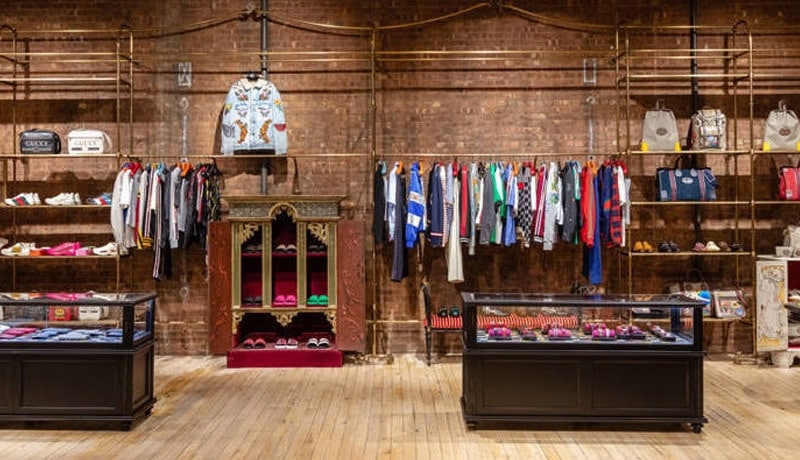Is there a role for tradition in the store of the future?
04/06/2018 | by Proximity

The traditional fashion business model has seen fundamental changes over the past decade, because of the digital revolution. It is now, more than ever before, convenient and easier to shop anytime, anyplace and the choice of products and services continues to grow. Brands now have greater and quicker exposure to markets that previously would have taken years to enter which makes the market even more competitive.
Furthermore, the UK high street continues to see unprecedented levels of closures. Marks & Spencer recently revealed plans to close a total of 100 shops by 2022. Other UK high street retailers have planned closures: Mothercare 50 stores, New Look 60, and House of Fraser 31 stores.
It is no wonder that retailers are looking at new ways to make their stores relevant to customers.
The in-store experience is of great importance and tradition plays a key role, particularly getting back to the basics for exceptional service. A traditional retail experience relies on a direct, face-to-face connection with the customer, who are 60% more likely to return to the same store because they value that connection with the retailer and importantly the sales associate. Unfortunately, those brands that have been slow to change their in-store experience are typically the brands that we now see closing stores.
A retail transformation is being seen across the whole fashion industry, at luxury and high street level. Brands are looking to connect with old and new customers in a more relevant, meaningful way.
Gucci chief executive Marco Bizzarri said shoppers are equally bored by traditional stores and bland websites. “The younger generation isn’t interested in the retail experience because the retail experience is not interesting.” In Gucci’s new SoHo, New York store, “connectors” (store associates) are hired for their ability to tell Gucci’s story. The brand story and how it is told, and by whom is becoming increasingly important.
Zara’s new Westfield Stratford store is ‘designed with pioneering technology to transform the customer shopping experience at its heart.’
Focusing on ease of transaction Zara integrate physical stores and online through automated order collection points (serviced by a concealed area able to handle 2,400 orders simultaneously), self-checkout and mobile payment systems support by staff with iPads.
In addition the customer experience is enhanced by interactive mirrors equipped with RFID which can detect the garment a customer is holding, enabling customers to see what a complete outfit will look like in the mirror.
Having used the self checkout at Westfield London and being asked by security to return to a till point after the security alarm went off due to the tags on accessories (which you can’t see or take off), I’m yet to be convinced by the efficiency for all transactions. However one thing that is clear is that it’s a step in the right direction, giving the customer the option of the type of experience they want. Implementing technology in the right way as we know is not as easy as pressing a button, and everyone needs to be on board with the change.
Connecting with store associates through human emotion, shared experiences and passion for a brand and it’s product must be supported by head office. Companies who are looking to remain relevant need to invest in their teams and the tools that the teams use to offer the best in-store experience possible.
I recently attended a FashMash Event where Farfetch MD of Store of the Future, Sandrine Deveaux, discussed her team’s approach to keeping retail exciting. A big part of it for Farfetch is empowering their ‘Instore Influencers’ (store associates) with knowledge. They view the role of the Instore Influencer as a totally new profession. A profession that needs to be nurtured, invested in and supported. The store associate has the ability to not only connect with the customer but influence the sale. If they have the right information about the product, the knowledge of how the garment was made, the story of the collection, how the designer translated their experiences and research into the collection, that might just make the difference between making a sale or not.
Valuing store associates is not a new concept. Traditional retailers know their customers intimately. Store associates often have a black book with preferences, phone numbers and past purchase history all noted. They genuinely care about their customer, and are often rewarded through sales commission. However, what is new, is the scale of new retail.
Retailers and brands have easier access to increased global reach because of the digital revolution. Which means to serve a customer, who may live in many countries, buying online and in physical stores, the need for ‘The Store of The Future’ has arisen. Creating a seamless, single view of a particular customer has become something that store associates worldwide need to manage. The black book has to be digital, on brand, and accessible to all from head office to in-store teams.
The key to the success of these tools is having the traditional drivers for relationship management at the core. It’s not about capturing data for the sake of customer capture metrics. It’s about using that information to cultivate a relationship, globally, on and offline.
Image credit gucci.com
07.06.18 Article amended to update House of Fraser store closure figures to 31 following announcement.